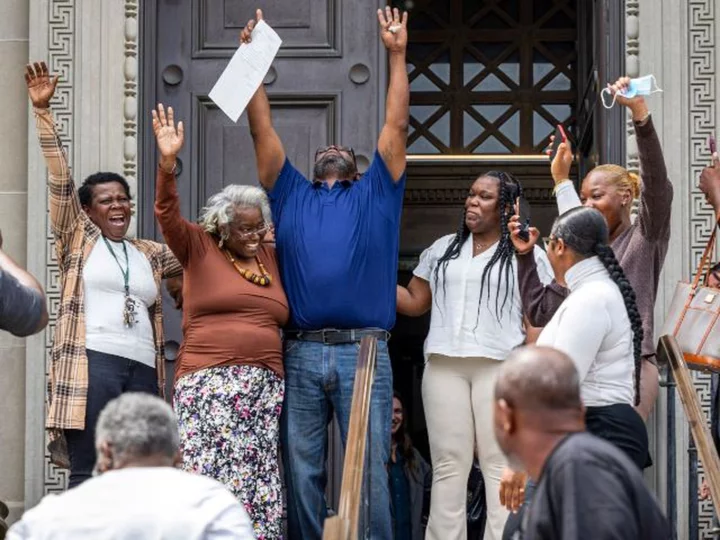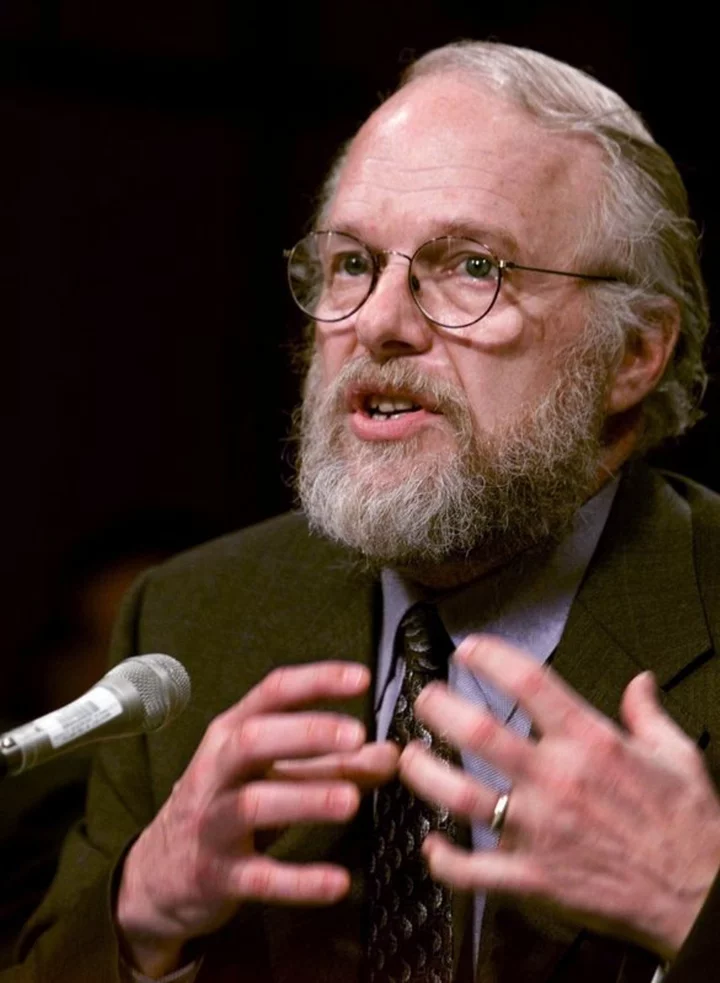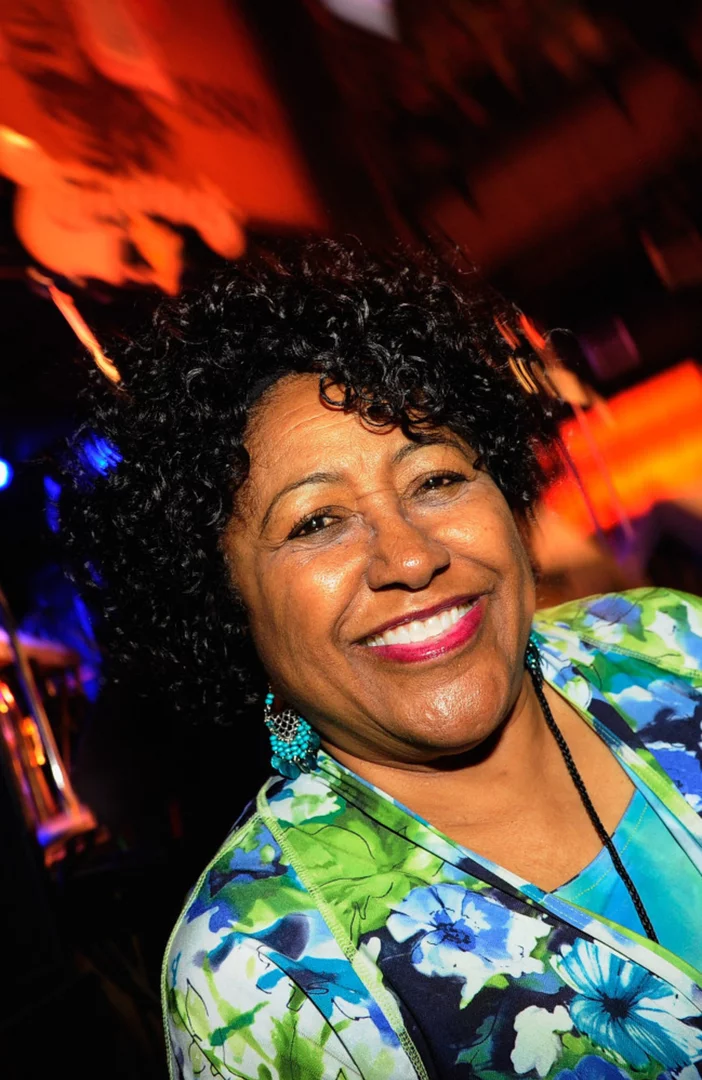When Patrick Brown walked out of a New Orleans courthouse last week a free man after spending 29 years in prison for a rape that even the victim says he didn't commit, he raised his hands toward the sky -- it was a moment of triumph.
But as he works to reconnect with his family and make a life for himself in an unfamiliar world after decades struggling for his freedom, he's realizing his fight isn't over just yet.
Brown was convicted of raping his 6-year-old stepdaughter in 1994 after pleading not guilty in a trial in which the victim did not testify, according to the Orleans Parish district attorney's office.
In the last 20 years, Brown's stepdaughter insisted he did not rape her, and repeatedly asked the district attorney's office under former administrations to review the case and prosecute the actual perpetrator, the office has said. From prison, Brown filed multiple petitions for his case to be reviewed.
This year, the office's civil rights division, started by current District Attorney Jason Williams, opened an investigation into the victim's case, found that the evidence corroborated her account and asked the court for rectification. A judge on May 8 vacated his conviction, and Brown was released immediately afterward.
Brown recalls feeling the air on his face during those first few moments of freedom.
"It was a relief -- felt like an 18-wheeler just lifted off my back that I was carrying for so many years," Brown told CNN Wednesday night in his first interview since his release. He said he felt warmth from all of the people who had gathered outside the courthouse to support him.
With loved ones by his side, he got into a car and was driven through a city that has seen many changes in the last 29 years.
Eleven years into his sentence, Hurricane Katrina hit New Orleans, changing the landscape of the city and sending many of his family members to different states. Brown received fewer visits after that.
"We came down Canal Street and everything was so different," he said, noting that even the look of the buildings had changed, "Different bricks."
It turns out more than just the bricks had changed. Brown was puzzled by the button near the steering wheel that started the car. Last he checked, "you had to have keys to open the car and start it up." Now that he's out, he plans to get his license.
He arrived at his nephew's home, where his family threw him a homecoming celebration. He saw some unfamiliar faces there -- family members who were born after Brown went to prison. His 29-year-old daughter Kimberly was a little over 1 month old when he went to prison. Now she has her own child, 8-year-old Oliver, who Brown is enjoying getting to know.
They caught up, ate and played the card game pitty-pat, which Brown remembers being a favorite in New Orleans.
A couple days later, Brown flew to Houston, where he's now staying with Kimberly and her family.
Before Brown went to prison, phones were in the house, with a cord attached. His family just got him an iPhone.
"They hooked me up. Top of the line -- iPhone 14 Pro Max," he said proudly -- though he's still learning how to use it.
Brown walked into a Target for the first time last week. Unsure of how to check out, he peered back over his shoulder periodically. After years of being watched closely in prison, that feeling is slow to fade.
But now he has privacy.
"I have a big old bed that I'm sleeping in, and it's so soft. God, it's so soft. My body just melts into the mattress," he said.
Years ago in prison, Brown read a recipe in a newspaper for fresh, lemon-flavored chicken. When he arrived at his daughter's house in Houston, he set out to make it.
"Real lemon seasoned chicken breast, mashed potatoes with gravy, dinner rolls, green beans with sausage," Brown said, noting that he had to pause in the middle of cooking. "I walked outside, then came back, just to make sure nobody was watching over my shoulders."
No one was. But a few loved ones have remained by his side.
Brown's mother, 72, after years away from her son and multiple heart surgeries, was standing beside him the moment he was released.
"She told me, 'Every night I prayed and asked the Lord to let me witness you walk free,'" Brown said. "I could have lost my mother while I was in there. God held her for me."
They celebrated this Mother's Day in style. Over 50 family members gathered in Houston, and Brown's mom wasn't sitting in the corner.
"I danced with her and said, 'Mom, you still got some moves,'" Brown said. She reminded him she was the one who taught him how to dance, he added.
Brown's grandson Oliver fell ill after the Mother's Day celebration, so the family took him to a children's hospital.
When Oliver shied away from the injection he needed, Brown rolled up his sleeve and let the nurse prick him with a needle first, to show him it wasn't so bad.
"He's a really good kid," Brown said. "I gotta keep him healthy, so he can teach me how to use my phone."
Rebuilding a life
It's not just the phone. Brown will turn 50 this July, and he's learning how to rebuild his entire life -- getting a job, a car and a place of his own. On Wednesday, he got his Social Security card.
"I want to live close to the country. I don't know about Louisiana. Maybe Alabama, Arkansas, somewhere like that -- just away from a lot of people," Brown said.
"Right now, I'm close to 50 years old. I don't know if I can see myself working until I'm 70, so I've got to get situated real quick," he added.
Brown was released with a small box of personal possessions, his lawyer Kelly Orians told CNN. His family has set up a GoFundMe page to help him start to rebuild a new life.
Orians, who directs the University of Virginia School of Law's Decarceration and Community Reentry Clinic, said it could take years for him to receive any sort of compensation for his wrongful conviction.
Under Louisiana law, people who have served time in prison and had their convictions vacated can petition to receive compensation. People are eligible for up to $400,000, paid out as $40,000 a year.
But for that to happen, the petitioner needs to prove to a court reviewing the petition that he or she is factually innocent, even though the sentence was already vacated. That means presenting clear evidence that they did not commit the crime they were convicted of, or any related crime based on the facts used in the original conviction.
For Brown, it means yet again having to ask the system that imprisoned him for decades to rectify the situation -- even after regaining his freedom.
Louisiana Attorney General Jeff Landry has often challenged these petitions -- opposing all but two that crossed his desk since he took office, according to data compiled from court records by the Innocence Project New Orleans.
"The current process for wrongfully convicted persons to receive lawfully owed state compensation is cruel, unfair, and tantamount to a double injustice," Williams, the Orleans parish district attorney, told CNN.
"The current attorney general's office has fought 83% of these cases and lost 100% of those ruled on by a higher judge," Williams said. "Almost all of these requests are currently being challenged despite the law being abundantly clear.
"Morally, exonerated persons are entitled to compensation for the years stolen from them; to deny or delay what is lawfully due them is unjust and a waste of taxpayer-funded resources."
Landry, who is running for governor in Louisiana, did not immediately return CNN's request for comment.
"(The attorney general) could use their discretion to just say, 'He's already proven his factual innocence. We're not going to do have him do it again.' But the state AG's office has been pretty adamant about forcing all of these to a hearing and opposing them," said Zac Crawford, a staff attorney with Innocence Project New Orleans.
Brown said he trusts his lawyers to guide him through the petition process. More than compensation, he said what he really wants to see now is a more responsible justice system -- one that listens to victims and takes the time to do due diligence.
"They let me down for 29 years. I lost a lot that I can't ever get back," Brown said. "I never got to see (Kimberly's) first day in school. Never got to hear the first words she spoke. I wasn't there when she graduated, (or) when she walked down the aisle."
Brown said he just wants to know that other families like his won't be torn apart.
"Let's not have another Patrick Brown," he said.









